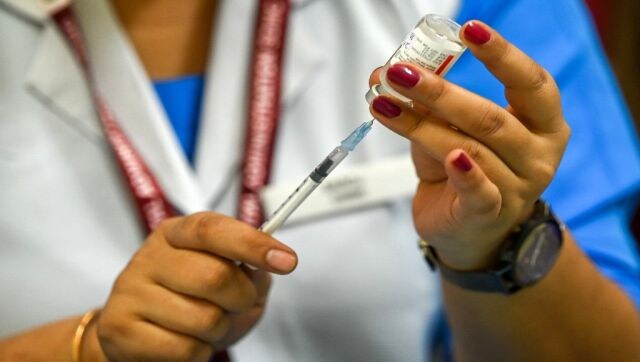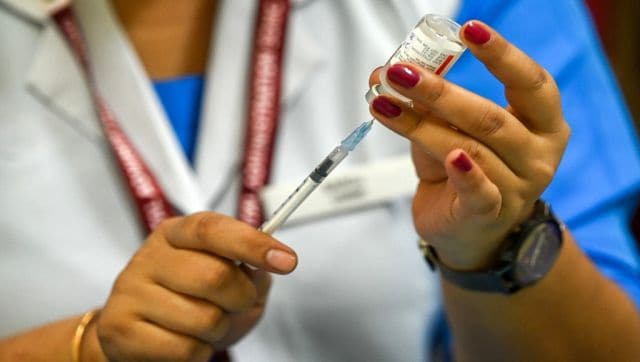Explained: Where does India stand on COVID-19 booster shots and what do experts have to say
The Centre is scheduled to meet next week to formulate a policy on booster jab against coronavirus as the inoculation drive picks up steam across the nation

A health worker prepares a dose of the Covaxin vaccine against COVID-19 at a health centre in New Delhi. AFP
As the voices for booster shots of the COVID-19 vaccine grow louder in India, the government, it has been reported, will release its policy on the same soon.
vaccine grow louder in India, the government, it has been reported, will release its policy on the same soon.
According to News18, senior government officials will meet next week to discuss the policy on the third vaccine jab in the country.
As this development emerges, here’s a quick understanding of what is a booster shot, what experts have to say on this matter and when are we likely to get it.
Booster COVID-19 shots
shots
According to Johns Hopkins medical institute, a COVID-19 booster shot is an additional dose of a vaccine given after the protection provided by the original shot(s) has begun to decrease over time.
booster shot is an additional dose of a vaccine given after the protection provided by the original shot(s) has begun to decrease over time.
Typically, one would get a booster after the immunity from the initial dose(s) naturally starts to wane. The booster is designed to help people maintain their level of immunity for longer.
However, one must remember that a COVID-19 booster is not the same as an additional dose.
booster is not the same as an additional dose.
A COVID-19 booster is given when a person has completed their vaccine series, and protection against the virus has decreased over time whereas an additional dose is administered to people with moderately to severely compromised immune systems. This additional dose is intended to improve immunocompromised people’s response to their initial vaccine series.
booster is given when a person has completed their vaccine series, and protection against the virus has decreased over time whereas an additional dose is administered to people with moderately to severely compromised immune systems. This additional dose is intended to improve immunocompromised people’s response to their initial vaccine series.
Countries delivering booster shots
According to Our World in Data, 36 countries are administering booster doses as of 25 October.
These include Germany, Austria, Canada and France.
The United States top the list having delivered 1.24 crore booster doses. Turkey comes next with 1.19 crore booster shots administered cumulatively, followed by Chile with 47.21 lakh doses, Israel with 38.96 lakh doses and France with 23.32 lakh doses.
However, the decision to deliver booster shots has been panned by the World Health Organisation. On 13 November, Director General Tedros Adhanom Ghebreyesus called the distribution of booster shots of COVID-19 a “scandal” as poorer countries continue to wait for the first jab.
a “scandal” as poorer countries continue to wait for the first jab.
Tedros Adhanom Ghebreyesus in his statement said, “It makes no sense to give boosters to healthy adults or to vaccinate children, when health workers, older people and other high-risk groups around the world are still waiting for their first dose. The exception, as we have said, is immunocompromised individuals.”
India’s vaccination drive
India has administered a total of 115.23 crore vaccine doses under the nationwide vaccination drive, which began on 16 January.
Official data revealed that the number of people in the country who are fully vaccinated against COVID-19 has surpassed those who are partially vaccinated. On 17 November, Union Health Minister Mansukh Mandaviya had announced that the number of fully vaccinated individuals (38,11,55,604) exceeded those who had been administered a single dose (37,45,68,477).
has surpassed those who are partially vaccinated. On 17 November, Union Health Minister Mansukh Mandaviya had announced that the number of fully vaccinated individuals (38,11,55,604) exceeded those who had been administered a single dose (37,45,68,477).
Indian experts speak
The issue of booster shots was recently raised by Dr Subhash Salunkhe at a National COVID Task force meeting.
The debate on boosters has stemmed from the issue of the vaccines’ effectiveness against the disease.
A number of published studies show that the vaccines’ — Covishield, Covaxin, Pfizer, Moderna — protection against infection, with or without symptoms, has fallen.
A study in England examined the vaccines’ effectiveness against the delta variant over time. It found that the Pfizer-BioNTech vaccine is about 90 percent effective at preventing symptomatic infection two weeks after the second dose but drops to 70 percent effective after five months. The same study found that the Moderna vaccine’s protection also drops over time.
These studies have prompted several experts on the issue of a booster shot. However, opinions vary on the issue.
The West Bengal Doctors Forum in early November had written to Union Health Minister Mansukh Mandaviya urging him to roll out a COVID-19 booster vaccination program for all healthcare workers (HCW) and frontline workers (FLW) “as early as possible.”
booster vaccination program for all healthcare workers (HCW) and frontline workers (FLW) “as early as possible.”
The body said that a booster shot would be an “effective measure” to prevent Covid infection “by maintaining the vaccine efficacy.”
Similar sentiments were echoed by Bharat Biotech’s chairman Dr Krishna Ella. The maker of India’s Covaxin as recently as 11 November had said a booster dose would be ideal at six months after receiving the second dose of the anti- COVID-19 vaccine.
vaccine.
This view is differing from the Indian Council of Medical Research (ICMR). Balram Bhargava, the director-general of ICMR, had in September said that the vaccine drive should focus on administering two doses to all eligible populations than booster doses.
Similarly, a doctor from All India Institute Of Medical Science was quoted as telling the Hindustan Times that India can’t afford to administer booster shots yet as only about 35 percent of the population is fully vaccinated against the COVID-19 disease.
disease.
So, as experts try to figure out the next step in our battle against coronavirus , we urge that everyone gets vaccinated and follow COVID-19
, we urge that everyone gets vaccinated and follow COVID-19 protocol.
protocol.
With inputs from agencies
For all the latest health News Click Here

